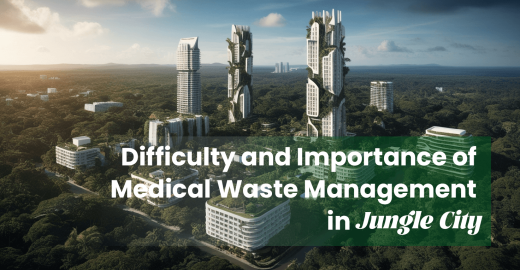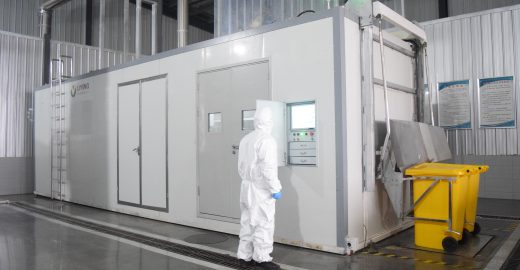What is the Polluter Pays Principle
The Polluter Pays Principle, abbreviated as PPP, means that the entities causing pollution should bear the costs of pollution control to prevent pollution from harming human health or the environment. In medical waste management, this principle implies that medical institutions, enterprises, and individuals that generate medical waste need to pay corresponding fees for the proper handling and disposal of such waste.
The Polluter Pays Principle is an important principle in the fields of environmental protection and sustainable development, and it is widely applicable to various environmental governance scenarios, including medical waste management. It emphasizes that polluters should bear the costs of environmental governance and restoration resulting from their polluting behaviors. In medical waste management, the Polluter Pays Principle is specifically manifested in the following aspects:
- Defining the Responsible Entities
- HealthCare Institutions: Entities that generate medical waste, such as hospitals and clinics, should be the direct responsible parties for managing and disposing of medical waste.
- Third-Party Service Providers: If medical waste treatment is outsourced to external agencies, these agencies should also fulfill their responsibilities according to relevant agreements to ensure the safe treatment of waste.
- Cost Allocation Mechanism The core of the Polluter Pays Principle lies in internalizing pollution costs through economic means, making polluters directly face the economic consequences of their actions.
- The costs of medical waste treatment usually cover the costs of classification, collection, transportation, storage, treatment, and final disposal. It is crucial to set reasonable charging standards. Studies have shown that when treatment costs are too high, some institutions may choose to illegally dump medical waste, thus causing environmental problems. On the other hand, if the costs are too low, it may lead to insufficient funds and affect the quality of waste treatment. Therefore, the government needs to calculate the actual costs and establish a charging mechanism that takes into account both fairness and incentives, and adjust it regularly to cope with market changes.
- This principle should also be applicable to other environmental impacts such as greenhouse gas emissions. The polluter pays mechanism helps internalize external environmental costs, thereby encouraging medical institutions to reduce waste generation, optimize management processes, or use waste management methods and disposal technologies with lower emissions, reducing the cost of achieving regional carbon neutrality.
- Legal and Regulatory Support
- The World Health Organization (WHO) points out that the legal system for medical waste management must clarify the economic responsibilities of polluters and formulate corresponding supervision and punishment mechanisms. National and local governments usually clarify the economic responsibilities of medical waste generators through laws and regulations (such as the "Regulations on the Management of Medical Waste").
- Regulations require the transparency of medical waste disposal costs and prevent illegal dumping or disposal of medical waste.
- Encouraging Source Reduction The practices of European Union countries have set an example for global medical waste management. EU countries generally implement strict medical waste management regulations and require medical institutions and enterprises to comply with the Polluter Pays Principle. For example, Germany has a medical waste classification charging system, charging different fees according to the types and hazard levels of waste. Meanwhile, countries like Germany also encourage enterprises to research, develop, and use environmentally friendly medical waste management equipment through tax policies and reduce the amount of medical waste generated.
- Social Benefits and Supervision The implementation of the Polluter Pays Principle in medical waste management not only restricts the directly responsible parties but also brings positive impacts to the whole society.
- Reducing Public Health Risks: Improper disposal of medical waste may lead to the spread of pathogens, endangering public health. The Polluter Pays Principle reduces the possibility of medical waste entering the environment by improving the waste management process, increases public confidence in medical waste treatment, and reduces environmental and public health risks.
- Enhancing Public Participation and Trust: Through open data and strengthened social supervision, the public can supervise the medical waste treatment process. This transparency enhances the social responsibility awareness of medical institutions and at the same time strengthens the public's trust in the medical waste management system. Some regions have introduced a public reporting mechanism and further strengthened supervision by rewarding informants.
Challenges and Suggestions
Although the Polluter Pays Principle has significant effects in medical waste management, it also faces some challenges in practice:
- Charging Standards: How to set fair and reasonable charging standards to avoid unbalanced burdens caused by overly high or low costs.
- Regulatory Loopholes: Illegal disposal of medical waste still exists in some regions, and supervision needs to be strengthened.
- Technical Support: Backward treatment technologies may lead to low waste treatment efficiency and high costs. Encourage the research, development and application of low-cost and efficient medical waste treatment technologies.
The Polluter Pays Principle is of great significance in medical waste management. By clarifying the responsible entities, optimizing the cost allocation mechanism. Improving laws and regulations, encouraging source reduction, and strengthening social supervision, the safe and efficient management of medical waste can be achieved, protecting the environment and public health. In the future, through continuous improvement of policies and technical support, this principle will inject more impetus into the sustainable development of the medical industry.
Ref:
https://environment.ec.europa.eu/economy-and-finance/ensuring-polluters-pay_en
For more information on medical waste management and professional disposal equipment, please contact [email protected]



